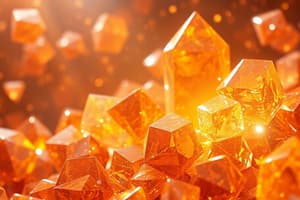Podcast
Questions and Answers
Which of the following best describes the behavior of solids?
Which of the following best describes the behavior of solids?
- They have definite shape but indefinite volume
- They have indefinite shape but definite volume
- They have indefinite shape and volume
- They have definite shape and volume (correct)
What is a characteristic property of solids?
What is a characteristic property of solids?
- Maintaining their own shape (correct)
- Changing volume based on pressure
- Conforming to the shape of the container
- Turning into gas at room temperature
Why do solids generally have a high density compared to liquids and gases?
Why do solids generally have a high density compared to liquids and gases?
- Solids have fewer particles than liquids and gases
- Solids have particles with strong attractive forces and are closely packed (correct)
- Solids have particles with weak attractive forces and are loosely packed
- Solids have more space between particles than liquids and gases
What is the primary purpose of computational chemistry?
What is the primary purpose of computational chemistry?
How does computational chemistry differ from theoretical chemistry?
How does computational chemistry differ from theoretical chemistry?
Why is achieving an accurate quantum mechanical depiction of chemical systems analytically not feasible?
Why is achieving an accurate quantum mechanical depiction of chemical systems analytically not feasible?
What is the role of computational results in relation to chemical experiments?
What is the role of computational results in relation to chemical experiments?
How does theoretical chemistry differ from computational chemistry in terms of algorithm development?
How does theoretical chemistry differ from computational chemistry in terms of algorithm development?
Flashcards
Shape of Solids
Shape of Solids
Solids maintain their own shape due to strong attractive forces between their particles, which are closely packed together.
Volume of Solids
Volume of Solids
Solids have a definite volume, meaning they occupy a fixed amount of space.
Density of Solids
Density of Solids
The density of a substance is a measure of how much mass is contained within a given volume. Solids are typically denser than liquids and gases due to their tightly packed particles.
Computational Chemistry - Definition
Computational Chemistry - Definition
Signup and view all the flashcards
Computational vs. Theoretical Chemistry
Computational vs. Theoretical Chemistry
Signup and view all the flashcards
Complexity in Quantum Mechanics
Complexity in Quantum Mechanics
Signup and view all the flashcards
Computational Results & Experiments
Computational Results & Experiments
Signup and view all the flashcards
Algorithm Development
Algorithm Development
Signup and view all the flashcards
Study Notes
Solids
- Solids maintain their shape and volume because their particles are closely packed and have a fixed position in space.
- A characteristic property of solids is that they have a fixed shape and volume.
Density of Solids
- Solids generally have a high density compared to liquids and gases because their particles are more closely packed and have a lower amount of empty space.
Computational Chemistry
- The primary purpose of computational chemistry is to use mathematical models and algorithms to simulate the behavior of chemical systems.
- Computational chemistry differs from theoretical chemistry in that it uses computational methods to solve problems, whereas theoretical chemistry focuses on developing mathematical models.
Limitations of Analytical Solutions
- Achieving an accurate quantum mechanical depiction of chemical systems analytically is not feasible because of the complexity of the Schrödinger equation and the large number of particles involved.
Role of Computational Results
- Computational results play a complementary role to chemical experiments, providing a theoretical framework to interpret and understand experimental data.
Theoretical vs Computational Chemistry
- Theoretical chemistry focuses on developing mathematical models and algorithms, whereas computational chemistry applies these models and algorithms to solve problems.
Studying That Suits You
Use AI to generate personalized quizzes and flashcards to suit your learning preferences.




